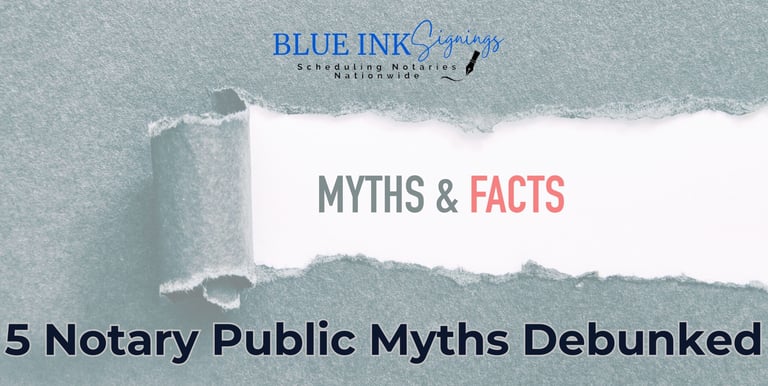Debunking 5 Common Myths About Notaries
In this blog post. we'll take a look at 5 common myths regarding notaries public and why they are not true. We'll provide you with some facts regarding what notaries can and cannot do.
NOTARY PUBLICNOTARY MYTHSMOBILE NOTARYNOTARY SERVICESNOTARY LAW
Brian Klein
1/2/20252 min read


When it comes to legal documents and transactions, notaries play a crucial role. However, many people hold misconceptions about their functions and responsibilities. In this blog post, we will uncover five common myths about notaries and set the record straight. Understanding the truth about the role of a notary and what they or cannot do, can help you navigate notarial services with confidence.
Myth 1: Notaries Can Prepare Legal Documents
One of the most prevalent myths is that notaries can draft or prepare legal documents. In reality, notaries are not allowed to give legal advice or draft documents unless they are also licensed attorneys. Their primary function is to verify the identity of the signers and ensure they understand the documents they are signing. This myth often leads people to seek notaries for guidance on legal matters, which they cannot provide.
Myth 2: All Notaries Are the Same
Another common misconception is that all notaries have the same level of training and authority. In fact, notary laws vary widely by state, and notaries may have different specialties. Some notaries are commissioned by the state and may be limited to specific tasks, while others may have additional certifications and capabilities. It's essential to choose a notary who meets your needs and understands the relevant laws in your state.
Myth 3: Notarization Is Just a Rubber Stamp
People often think that notarization is a mere formality that can be accomplished with a rubber stamp. While a notary does indeed use a stamp, the process requires considerable responsibility. Notaries must ensure the document's authenticity and the signer's identity, which involves verifying identification and determining the signer's willingness to sign without coercion. Notarization carries legal weight, and it is not something to be taken lightly.
Myth 4: Notarization Makes a Document "Legal"
Notarization does not ensure the legality, truthfulness (or lack of), or the accuracy of the contents of a document. While a verification on oath or affirmation - also known as a jurat - a sworn statement that the contents of a document are correct may be the notary act required on some documents; having a document notarized only certifies that the signers have properly identified themselves and acknowledged signing the document in the notary's presence. The onus is on the signers of the document to ensure the document's content is legal and accurate.
Myth 5: You Only Need a Notary for Real Estate Transactions
Lastly, many people believe that notaries are only necessary for real estate transactions. This is far from the truth! Notaries can be required for various documents, including wills, power of attorney notices, and contracts. Anytime you need to verify signatures or the identity of those involved in a transaction, a notary can be invaluable. Recognizing the scope of notarial services can save you time and protect your interests.
Conclusion
Understanding these myths about notaries and the true role a notary serves can help you make informed decisions in your legal matters. If you're ever in doubt, it's always wise to consult a legal professional and be sure to ask the notary about the services they provide. By demystifying notarial services, you can utilize them effectively to protect your important transactions.
FOLLOW US
Contact US
©2024 All rights reserved - Blue Ink Signings LLC


